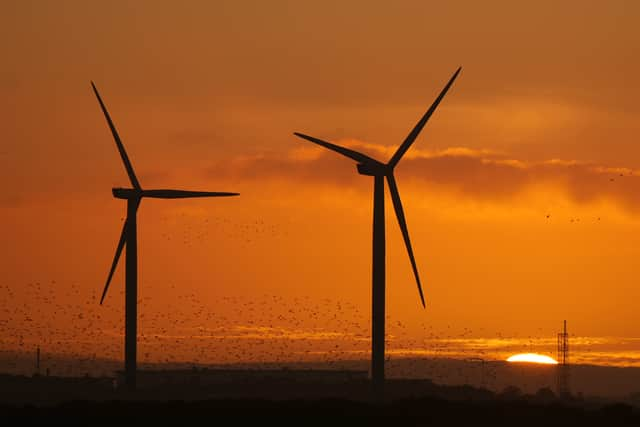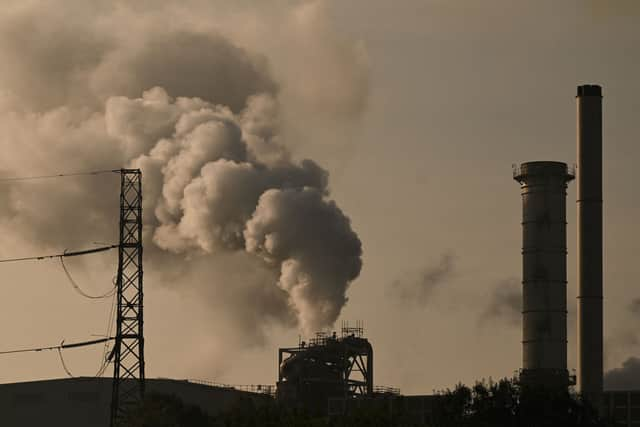Fossil fuel production set to soar 110% by 2030 despite climate change goals, UN report finds
This article contains affiliate links. We may earn a small commission on items purchased through this article, but that does not affect our editorial judgement.
and live on Freeview channel 276
Fossil fuel production is set to ramp up over the next decade despite governments around the world committing to reducing their climate impact, a UN report has found.
It is news which will concern the UK Government, which is hoping to get countries to agree to more ambitious climate change targets at COP26 in Glasgow in under two weeks’ time.
Advertisement
Hide AdAdvertisement
Hide AdUnited Nations Environment Programme (UNEP) analysis of national energy plans and projections found governments are planning to produce 110% more fossil fuels by 2030 than the amount required to keep warming to 1.5 degrees celsius.
Its report projects that by 2040, this gap would widen to 190% unless governments commit to more ambitious fossil fuel reduction plans.
The 1.5 degrees celsius target was a key facet of the 2015 Paris Agreement and is regarded as being a level at which the scale of climate change could be kept at a manageable level.
We want to hear from you: let us know what you think about this story and be part of the debate in our comments section below
Advertisement
Hide AdAdvertisement
Hide Ad

What does the report show?
The UNEP report shows the gap between planned production and the levels of production necessary to hit the world’s climate goals has “remained largely unchanged” since its first iteration in 2019.
It found that in real-terms, global fossil fuel production is set to increase until 2030 before plateauing over the following decade.
While coal production is set to decrease, that of oil and gas is set to continue rising sharply.
By 2030, existing production plans and projections would lead to the production of around 240% more coal, 57% more oil, and 71% more gas than would be consistent with limiting global warming to 1.5°C.
Advertisement
Hide AdAdvertisement
Hide AdThe report’s authors also found G20 countries - those with the largest economies in the world - have directed around $300bn in new funds towards fossil fuel activities since the beginning of the COVID-19 pandemic — more than they have put towards clean energy.
While the UK has set targets to reduce its production of oil and gas by 2030 against a 2019 baseline, the US, China and Russia are set to continue to ramp up their production of the two fossil fuels.
India and Russia are also projected to increase coal production over the next decade, while Australia was set to maintain its own coal production.


What does the report say needs to happen?
The report’s authors urged governments and companies to be more transparent about fossil fuel production, so that the gap between current energy plans and the level they need to be to limit climate change could be more easily identified.
Advertisement
Hide AdAdvertisement
Hide AdThey also called for governments to factor their production plans into their climate commitments under the Paris Agreement.
Inger Andersen,executive director of UNEP, said: “The devastating impacts of climate change are here for all to see. There is still time to limit long-term warming to 1.5°C, but this window of opportunity is rapidly closing.
“At COP26 and beyond, the world’s governments must step up, taking rapid and immediate steps to close the fossil fuel production gap and ensure a just and equitable transition. This is what climate ambition looks like.”
Public opposition to green vehicle policy
The news comes as polling of 9,000 people in seven European countries by the YouGov-Cambridge Centre for Public Opinion Research showed high levels of opposition to a ban on new diesel and petrol vehicles after 2030.
Advertisement
Hide AdAdvertisement
Hide AdThis opposition came despite widespread concern about climate change.
In Great Britain, 76% of those polled said they were either very or fairly concerned about climate change, but 27% indicated opposition to a ban on new petrol or diesel vehicles.
In Germany, where 70% of participants expressed concern about climate change, 50% opposed such a ban – the highest of the seven countries surveyed.
But when it came to renewable energy, such as solar, wind and tidal power, 66% of those in Britain supported the idea of the Government tripling investment in their production.
Advertisement
Hide AdAdvertisement
Hide AdMeanwhile, a separate poll, conducted last week, indicated that less than a third of British adults had read or heard much about COP26.
Just 31% of the 1,659 adults surveyed by YouGov said they had read or heard “a lot” or “a fair amount” about it, compared with 63% who answered either “not very much” or “nothing at all”.
Additional reporting by PA
A message from the editor:
Thank you for reading. NationalWorld is a new national news brand, produced by a team of journalists, editors, video producers and designers who live and work across the UK. Find out more about who’s who in the team, and our editorial values. We want to start a community among our readers, so please follow us on Facebook, Twitter and Instagram, and keep the conversation going. You can also sign up to our email newsletters and get a curated selection of our best reads to your inbox every day.
Comment Guidelines
National World encourages reader discussion on our stories. User feedback, insights and back-and-forth exchanges add a rich layer of context to reporting. Please review our Community Guidelines before commenting.
